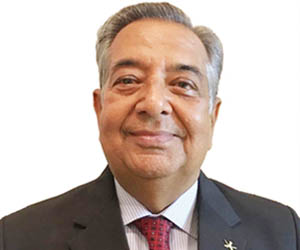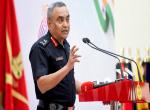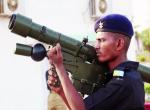“I am not afraid of an army of lions led by a sheep; I am afraid of an army of sheep led by a lion."
Alexander the Great
Time to move on
Ever since the nomination of the now incumbent Army Chief was announced, there has been widespread discussion and public debate on this issue. It was only as expected and squarely indicative of the importance of the appointment, and the trust and affection in which the people hold their Armed Forces.
At the outset, I must unequivocally say that General Bipin Rawat is a most outstanding officer with an illustrious record of service both in war and active insurgency areas behind him, and that he will most certainly lead the Army with distinction. I wish him all the success and the Army should be proud of being led by him.
Having said that, let me also make it clear that the two passed over Army Commanders also have outstanding record of service and in the words of the Raksha Mantri himself, “their not being selected does not reflect on their merit”. The opinion of the supporters of the Govt’s selection feel that the new Chief’s intense hands-on experience of the proxy war in Jammu and Kashmir, last year’s operation in Myanmar as Corps Commander and performance as Vice Chief during the Surgical Strike etc have clinched the nomination for Gen Rawat. However, in careers spanning approx. 40 years or so, it is inevitable that some will have comparatively more exposure to certain conditions than the others. This is even when in our system, officers above Brigadiers level are exposed to varied sectors and operational situations and by and large all of them generally acquire the experience and qualification to handle all types of formations in any appointment assigned to them. Having said this, it will also be churlish to cast shadows of imaginary rivalry between infantry and armoured corps just because an infanteer has been made a Chief. At this high level, to which Arm you belong, is not an important factor, because all arms are equally important and all have their specific roles cutout to play in wars; definitely none can replace the other.
Service Chiefs have to possess incisive vision and deep insight of the broader politico – strategic complexities at the national/international level to exercise overarching control over the nation’s hard power. Exercising acumen at tactical level or experience of any particular arm can neither be their forte, nor can that be the main criterion to be the nation’s top military commander. In this case, in all fairness, it is assumed that the Govt has taken a decision, which in their judgement is in the best interest of the country, even while departing from the normal convention of going by the seniority, all other factors being equal.
However, the concern of the people and that within the Armed Forces is that the time tested principle of seniority should not be overlooked, unless the merit is overwhelmingly in favour of an officer, who is lower down in the seniority. The tricky issue in this consideration remains, as to how does the Govt decide the merit and under no circumstances plays favorites. The apolitical ethos of the Services has been one of the strongest pillars of our stable and strong democracy. Any possibility of the senior commanders currying favour with the political leadership definitely will be against the long term interest of the Armed Forces themselves as also the nation and is more importantly fraught with risks. Thus, the same must be guarded against and should not even most remotely govern the selection of such crucial appointment as an Army Chief.
The Importance of Army Commanders
Here we need to do a little soul searching and introspection within the Armed Forces to ask ourselves as to whether are we selecting only the best as the army commanders and thus throwing up only the very best for the selection of a Chief. The quality of the Army Commanders has a direct bearing on the selection of a Chief.
The changing nature of war today covers a spectrum of conflict that ranges from application of nuclear, information, cyber, space and asymmetric capabilities, besides of course, the conventional and sub-conventional mode of warfares – all to be prosecuted in joint-services environment. Inevitably therefore, the Indian Armed Forces are going through phenomenal changes in terms of modernization of weapons, combat systems and strategic application of overall military power. The army commander’s role in this entire gambit is most pivotal. In our context, the army commanders are also responsible for vast geographical areas and different commands have span of control encompassing areas like full J&K, Rajasthan, entire North –East etc. Besides commanding all forces in their theatres of war, the army commanders also participate in decision-making at apex level on strategic, operational, training equipment, personnel administration and logistic issues etc. Further, their responsibilities spread to the exercise of institutional control over defence establishments dealing with quasi-military administrative, financial, logistic and judicial matters. These all add upto humongous responsibilities.
Finally, the Govt has to nominate the nation’s Service Chiefs from amongst the army commanders. It is obvious therefore that only the most meritorious among the eligible candidates (corps commanders) should be selected to be the army commanders. The present system of appointment of army commanders is however heavily skewed in favour of residual service and seniority, and not inter se merit, among the eligible candidates. It is here that there exists a definite room for improvement and is thus discussed subsequently.
Infirmities in the Present system
The penultimate rung to be elevated to the appointment of army commander is the command of a corps – the highest operational formation. (example given relates to the Army but generally holds good by implication for the other services also). Besides that eligibility, the other stipulation is that in the interest of meaningful contribution and continuity in such a pivotal appointment, the candidate must have a minimum period of two years (lesser residual service in case of Navy and Air Force) to serve on being elevated to the appointment of an army commander. Finally, among those, who qualify under these two criterion, the army commanders are nominated in order of seniority. As can be seen there is no process of deep selection amongst the incumbent corps commanders to select the army commanders. Why should it be so for such a critical appointment when, officers are being moved upward at every other rank strictly after being put through stringent selection boards and consequent heavy supersession in each rank from Colonel onwards.
At any time of an army commander’s post falling vacant, there could be many among the 14 incumbent corps commanders, and some more who would have moved out after command to other appointments, who could be considered to fill that vacancy. Among these officers, there would be many who would have commanded a corps with distinction, but not having two years left to serve at the time of occurrence of a vacancy are not considered eligible for elevation to the command of the army. Thus there are numerous instances of leaders of outstanding merit who perforce get sidelined to staff posts to await superannuation, while officers of somewhat lesser merit get elevated to the command of an army.
Herein lies the lacunae, wherein the residual service of two years and seniority at the time of occurrence of the vacancy have been the governing factors to virtually routinely elevating the Corps Commanders to the status of army commanders, even at the cost of the merit. This system was being followed not without logic and was based on four considerations. Firstly, that the corps commanders were automatically considered to be good enough to be army commanders, which is not necessarily correct in all cases. Secondly, it was felt that at this senior stage, the selection system should be done away with to remove any unwarranted competition amongst the candidates, more so when a viable residual service in the appointment was also an important aspect. Thirdly, because of the short spans of tenures especially in higher rank, as to whether enough inputs will be available to make a further selection. Finally, the problem of exactly who would be the member of the selection boards? The Chief alone cannot constitute this.
“Merit First” –The Overarching Criteria
This is an anomalous situation, for in every other promotion in the services, the mandatory criteria for selection is merit. It is only after empanelment in the selection boards that officers are placed in the order of their inter-se seniority. With the profoundly pivotal role to be performed by the army commanders especially in the fast changing paradigms of wars, it is very essential that elevation to this level should only be made through deep selection, notwithstanding the problems listed above.
Some suggestions which could be considered are given subsequently. If the stipulation of two years tenancy, which had been introduced to have stable tenures at the Army Commander’s level (one and a half years in the Air Force and one year in Navy) is curtailed to 18 months, this would widen the availability of eligible candidates for selection from 16-18 per year. As roughly four to five vacancies are only likely to occur in a year, that would restrict the selection to four or five only; and that would tantamount to real deep selection, as the approval percentage would be curtailed to just 25-30 percent.
This would ensure that not only the best become the army commanders, but also inter alia the very best out of the best would be available to the Govt to be appointed as the Chiefs. Then there would be virtually no possibility - necessity left to make any comparative choice from amongst the army commanders available to the Govt for the appointment of the Chief. This process will serve the nation’s interest best and also ensure that not only merit remains the sole criteria at this level but also is believed to be so.
As regards the selection process, in the best spirit of objectivity and jointness amongst the three services, the three service Chiefs (and four when Chief of Defence Staff or Permanent Chairman Chiefs of Staff Committee is introduced) can constitute the selection boards. The Chief of the Service, for which the candidate is being selected, can be the presiding officer. After the selection, the board result can be sent to the Govt for approval as in all cases from Colonel upwards. Some other systems, which are being suggested, like the PM, Chief Justice of India and Leader of Opposition forming the selection committee for Chiefs are considered undesirable in a system, which unlike others goes through a very thorough churning at every level. You surely cannot select a Chief by going through only dossiers.
Time for selection of Army Commanders has come!
Time has since long come to introduce some very pressing reforms in our military command structure and level of preparedness. The present Govt is known for its ability to take decisions and will do well to now introduce these reforms. Deep selection for Army Commanders is the call of the day. Army commanders thus selected will also facilitate the very best being available for selection for the appointment of Chiefs. This will also leave no requirement and scope whatsoever to bypass the seniority criterion, as all eligible candidates will be exceedingly competent.
The writer is a former army chief and is currently Director Vivekananda International Foundation







.jpg)

